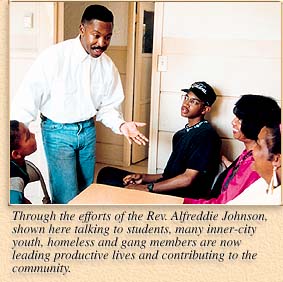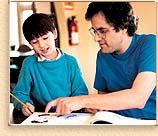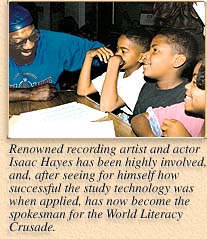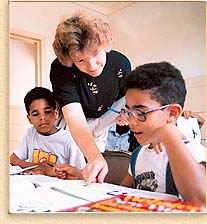

 Literacy Programs Make the Difference in LA
Literacy Programs Make the Difference in LA

obby’s life went down and down and finally struck bottom — on the concrete pavement of skid row.
Many people had cars, jobs, homes, families. But he had nothing.
He lived on the streets, with no job and no one to turn to. Addicted to drugs and alcohol, almost all the money he could find or earn went to support his habit. Underneath it all, he was illiterate.
He detested the life he was trapped in, but saw no alternative. “I just couldn’t go about living any other way,” he said.
But then, almost by accident, he found his way out of the hole. He heard about a program being run in a neighborhood church, and enrolled in it. It wasn’t religious studies or a 12-step program. It was something which enabled him to read and write – skills he needed desperately to be able to get a job and regain self-esteem.
 Everything in his life changed. Within a year, he had improved his reading and comprehension skills to college levels. He applied for job training and was accepted. He cleaned up his lifestyle and found a place to live.
Everything in his life changed. Within a year, he had improved his reading and comprehension skills to college levels. He applied for job training and was accepted. He cleaned up his lifestyle and found a place to live.
“I can’t tell you how much this program helped me,” Bobby said. “I may not even have been alive today if I hadn’t done it. Now, I am better off than I ever have been, and I know I have a future.”
He has a future today, thanks to the revolutionary educational breakthroughs provided by the World Literacy Crusade in Compton.
Innovative Methods
 Failed efforts to improve education in recent decades raise an important question: With so much attention on the quality of schooling, with billions spent each year to remedy the situation, why so little improvement?
Failed efforts to improve education in recent decades raise an important question: With so much attention on the quality of schooling, with billions spent each year to remedy the situation, why so little improvement?
The answer is simple. These efforts have been directed at solving the wrong problems.
At the root of educational failure lies a fundamental situation almost universally overlooked: Students have never been taught how to learn.
They are instead sent into classes and subjects without being taught how to go about the business of learning. As they grow older, they are confronted by increasingly complex areas of study – still without ever having learned how to learn.
L. Ron Hubbard recognized the failings of modern education in 1950, many years before horror stories of scholastic deficiencies began to make headlines.
“Although education is very widespread, and indeed is the practice best accepted by this society for the betterment of individuals, it yet lacks any tightly agreed upon method or conduct codification for relaying of data to the student,” he wrote. “Custom has dictated a certain politeness on the part of the professor or teacher. It is generally believed to be necessary to examine with rigor and thoroughness. Students are not supposed to whisper or chew gum, but education in general has no code designed to oil the flow of data from the rostrum to the student bench. On the contrary, a great many students would declare that any existing code was designed to stop any flow whatever.”
His investigation into the problems of teaching others led to a breakthrough – the first comprehensive understanding of the real barriers to effective learning. From this, he developed precise methods on how to learn any subject – methods which ensure a person will not only fully grasp what he is studying, but be able to proficiently apply what he has studied in work or in life.
These breakthroughs came to be known as “study technology,” and provide the first fully workable approach to teaching people exactly how to learn. Study technology opens the door to effective training and makes it possible to raise the general quality of education to new heights.
For years, the results from the use of study technology have been extensive, as have been the numbers of educators, companies and government agencies which have used and endorsed the methods.
In a project conducted in Brixton, a district of London, England, students aged between 8 and 13 were put through a specially prepared course in reading skills based on the study technology. The course focused on finding misunderstood words in their current studies and each student spent eight to ten hours over ten days doing the course. Based on standard reading tests, the students who went through this course gained an average of 1.3 years in reading age. A control group comprised of students who weren’t put through this course actually experienced a slight drop of 0.03 years in reading level.
A Los Angeles study showed an average gain of 1.8 years in vocabulary and comprehension after only 10 hours of tutoring in study technology. A study in Arizona showed an average gain of two years in comprehension and vocabulary amongst those who participated in school programs where study technology was used. In South Africa, one class of underprivileged high school students was trained in study technology, and at the end of the school year achieved a 91 percent pass rate on the country’s Department of Education examination – a substantial improvement.
Statistics such as these translate into effective education and an assurance that our youth can grow up to a confident, self-reliant adulthood with learning skills they will use every day of their lives.
Grass-Roots Programs

Bobby, mentioned above, attended the Learning and Literacy Project, a groundbreaking program in Compton, California, administered in conjunction with Applied Scholastics International, which uses the educational methods of Mr. Hubbard.
Applied Scholastics International is a non-profit, public benefit organization whose purpose is to improve education worldwide. With international headquarters in Los Angeles, affiliated offices are located in Mexico, the United Kingdom, South Africa, Denmark, Sweden, Germany, Austria, France, Australia, Malaysia, Russia and Venezuela. Millions have gained literacy through Mr. Hubbard’s study technology in Applied Scholastics programs, and thousands of children and adults alike benefit from these programs around the world every day.
These programs have proven to be among the most effective solutions to declining education ever offered. Key to understanding the reason for the program’s success is grasping the revolutionary methods it uses.
While Applied Scholastics programs have had enormous success in schools and tutoring, remarkable results – like Bobby’s – have come from grass-roots programs in inner cities and underprivileged areas around the world. One of the best known is the World Literacy Crusade, which started in Compton in 1992 and has now spread to many other cities.
Formed in the wake of the Los Angeles riots, the World Literacy Crusade was born at what was literally and figuratively ground zero; Compton had been extremely hard hit by the destruction.
Stirred into action by the widespread looting and criminality that had ravaged their neighborhood, a group of Compton clergymen, headed by Baptist minister Rev. Alfreddie Johnson, decided to do something effective and real so that such a chapter of history would never repeat.
Their answer was to pull together as a community and get to the root of the social decay around them: illiteracy. Rev. Johnson and the other ministers realized that they had to conquer illiteracy to solve community problems.
Assisted by Applied Scholastics International, Rev. Johnson began employing the study technology and formed the Compton Learning and Literacy Project, where children and adults received free tutoring and training in literacy, study and communication. And out of Rev. Johnson’s program, the World Literacy Crusade was born.
As a result, hundreds of inner-city youth, homeless and gang members have been through the program and are now leading productive lives and contributing to the community.
Fred Shaw Jr., a 13-year veteran of the Los Angeles County Sheriff’s Department – and World Literacy Crusade co-founder – is direct in his assessment of the Crusade’s challenge: “Robbery isn’t what’s really wrong. Burglary isn’t what’s really wrong. Drug abuse isn’t what’s really wrong. The lack of knowledge is what’s wrong in the inner city.
People talk about rebuilding cities, rebuilding the buildings, but they haven’t got the point. If we are going to make a change in the inner city we need to rebuild the people. We need to give them the strength to grow and stand out and be all that they can be. The problem is that our own people cannot read and write. Underneath the drug dealing are people who are illiterate. Underneath the gang violence are people who are illiterate. So if we are going to do anything to change the inner city, then we must give people what they need."
The testimonials of children and adults who have done the program tell the story best.
One man in his late teens said, “I had trouble growing up, because of my color and my environment. I got into drugs and gang-banging, and I got in too far and got myself shot. I wound up in this program here in Compton, and all of that is totally in the past now.
“The study technology is powerful. It makes you want to learn, makes you your own teacher. These people stuck with me until I woke up and realized that I could learn and that I wanted to.”
Another said, “I saw a psychiatrist who told me I was dyslexic. But I came to the literacy project here in Compton, and in two or three weeks I was reading perfectly. I was able to go back to school and show off what I learned – I was reading better than the other kids.”
Although similar World Literacy Crusade programs now exist in many cities, one of the first places the program spread to was the Los Angeles probation system. Children and adults on probation received the benefits of their own literacy program – with huge success.
Regional probation office director Don McGruder said, “I was very impressed at the level of interest and enthusiasm in study demonstrated by the kids enrolled on the program. In fact, some were so excited that they started telling their friends who weren’t on probation, ‘Man, we’re learning how to read down at the probation department,’ and as a result, more kids – ones who aren’t on probation – started coming in to do the program as well.”
After seeing the program in action, many celebrities became interested and helped to promote it broadly.
Renowned recording artist and actor Isaac Hayes has been highly involved, and, after seeing for himself how successful the study technology was when applied, has now become the spokesman for the World Literacy Crusade. “The problem is kids in the ‘hood aren’t learning to read,” he said. “When kids don’t get what their instructors are trying to teach them, they leave the classroom or leave school because they don’t want to feel dumb and stupid like they can’t learn. They’re embarrassed to say they don’t know, so they just get out of there. But with this technology, which is so simple, so basic and yet very effective, they can get it, and they can be in control.”
Many others, such as Actress and Applied Scholastics spokesperson Anne Archer, Kelly Preston, Chick Corea, Edgar Winter and John Travolta, have given their time and energy to get the Crusade moving forward and expanding so that it can help more and more of the underprivileged people who have found real learning inaccessible. One for one, they have seen the results of application of the study technology firsthand and remarked how much they want to see everyone benefit from it. Such sentiment is widespread among those who see it for themselves – and thus the support for such programs continues to expand.
The Future of Education
Applied Scholastics and its affiliated programs and schools which use the study technology are a bright hope for the future of education. By providing workable methods and a means to understand and apply them, students who use the study technology can gain an ability to learn that no other technique delivers.
“These educational techniques are simple and profound in their ability to empower the community to learn how to learn,” said Rev. Johnson. “They are a monumental tool not only for those who desire to learn, but those who want to teach others.”
“This technology smashes illiteracy and produces dramatic, life-changing results,” said Isaac Hayes. “We have gotten homeless people to leave the streets and get jobs. Gang members have stopped their violence. Some have even become tutors in our program. Completely illiterate people have learned to read.
“The single greatest challenge confronting the African American community is the eradication of illiteracy. There are certainly other problems, but if we don’t handle this one first, we won’t be able to handle the others. This technology empowers us to get the job done, to take our destiny into our own hands.” 
For more information, write: Applied Scholastics International 7060 Hollywood Blvd., Ste 200, Los Angeles, CA 90028. or click here
|




 Literacy Programs Make the Difference in LA
Literacy Programs Make the Difference in LA

 Everything in his life changed. Within a year, he had improved his reading and comprehension skills to college levels. He applied for job training and was accepted. He cleaned up his lifestyle and found a place to live.
Everything in his life changed. Within a year, he had improved his reading and comprehension skills to college levels. He applied for job training and was accepted. He cleaned up his lifestyle and found a place to live.
 Failed efforts to improve education in recent decades raise an important question: With so much attention on the quality of schooling, with billions spent each year to remedy the situation, why so little improvement?
Failed efforts to improve education in recent decades raise an important question: With so much attention on the quality of schooling, with billions spent each year to remedy the situation, why so little improvement?

